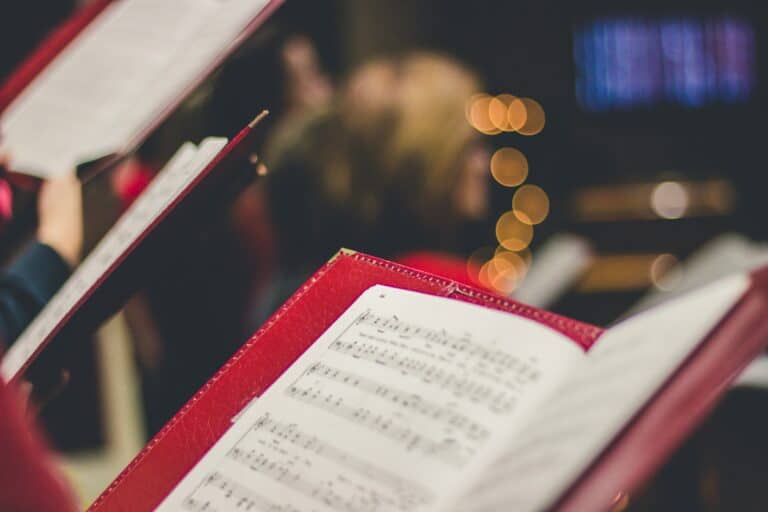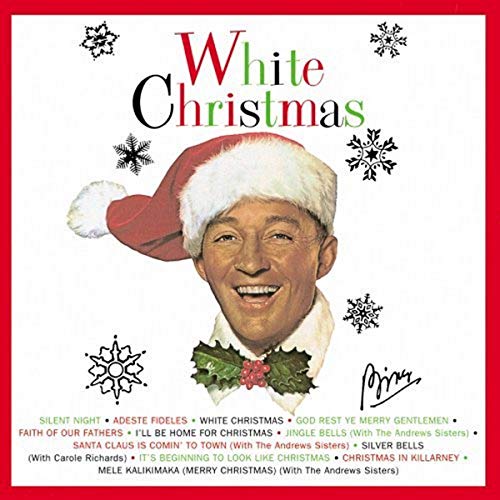
In 2024, the first night of Hanukkah falls on Christmas — a literal Chrismukkah a la “The O.C.”
With that, we at Unpacked have decided to address many Jewish contributions to Christmas. Who knew that the inventor of the artificial Christmas tree never owned one because he was Jewish? And the writers of many of your favorite Hallmark Christmas movies were Jewish as well? But our focus today is on arguably the most notably Jewish contribution to the holiday: Christmas music!
Likely every place you go has had Christmas music blasting since Nov. 1, and at this point you likely are tired of hearing the same carols and tunes on repeat. However, you might gain a new appreciation for the holiday classics when you learn about their Jewish histories.
Why did Jewish composers write Christmas music?
The answer, like most answers of why Jewish people joined certain fields, is antisemitism.
In the early 20th century, Jews were shut out of many industries and were relegated to “low art” fields like the early film industry, the comic book industry, and commercial music where they didn’t face discrimination.
As a result, artistic Jews flocked to those industries to make a name for themselves. Christmas songs have always been popular and thus, Jewish composers began to write them.
Michael Feinstein, the archivist and interpreter for the “Great American Songbook” said that most mainstream Christmas songs are focused more on the essence of Christmastime and the winter, which made Jewish people comfortable with writing them.

“The Christmas songs that are popular are not about Jesus, but they’re about sleigh bells and Santa and the trappings of Christmas,” Feinstein said. “They’re not religious songs.”
These Christmas tunes also were a way for Jewish writers, who were often immigrants or first-generation Americans, to connect with what they viewed as an “American holiday.” Christmas was rapidly becoming a commercial, more secular holiday. Writing these songs allowed Jews to connect with their American identities and begin to assimilate.
“These songs made Christmas a kind of national celebration, almost a patriotic celebration,” Rabbi Kenneth Kanter, who studies Jews and popular culture, said.
Which famous Christmas songs were written by Jews?
“White Christmas” by Irving Berlin
Irving Berlin — best known for his patriotic anthem “God Bless America” — was born Israel Baline in Russia. His family, including his father, a cantor, immigrated to the U.S. in 1893, landing in the vibrant, bustling Lower East Side of New York City.
Berlin’s daughter shared that her father’s deep gratitude for the U.S. — the country that lifted his family out of poverty — sparked his love for Christmas, as he viewed it as the quintessential American holiday. Channeling that appreciation, Berlin penned the iconic “White Christmas” in 1947, blending patriotism and holiday spirit into a timeless ode to America’s holiday traditions.“
“White Christmas” is considered to be the song that encouraged other Jewish writers to try their hand at Christmas music.
“Let it Snow” by Sammy Cahn and Jule Styne
Sammy Cahn — lyricist, songwriter, and all-around musical genius — was born Samuel Cohen in 1913 to Galician Jewish immigrants. Raised on New York City’s bustling Lower East Side, young Sammy was destined for stardom. His big break came when he turned a Yiddish theater tune, “Bei Mir Bist Du Shon,” into an English smash hit for the Andrews Sisters. Not too shabby, right?
Later, Cahn teamed up with fellow Jewish composer Jule Styne out in Hollywood, where the duo cranked out timeless tunes — including the wintery classic “Let It Snow!” Fun fact: this frosty favorite skips Christmas altogether, making it a go-to jam for anyone who loves snowy vibes.
But Sammy didn’t stop there. He went on to snag four Oscars and teamed up with Frank Sinatra to pen a whopping 89 songs (talk about a power duo). By 1972, he earned a well-deserved spot in the Songwriters Hall of Fame. Not bad for a kid from the Lower East Side!
“You’re a Mean One, Mr. Grinch” by Albert Hague
“You’re a Mean One, Mr. Grinch” — and a classic one, too! The music for this beloved Dr. Seuss holiday special was composed by Albert Hague.
Born in Germany to Jewish parents who, believing Judaism put them at a disadvantage, raised him as a Lutheran, Hague later fled the Nazis in 1937. A compassionate Christian doctor helped him secure a resident visa to America, where Hague reconnected with his roots, fully embracing his Jewish heritage. A trained composer, he added acting to his résumé later in life, famously playing the music teacher in the “Fame” movie and TV series. Talk about a multi-talented mensch!
“Silver Bells” by Ray Evans and Jay Livingston
Ray Evans and Jay Livingston teamed up to create this jazzy wintertime classic. While the song skips over religious themes, it perfectly captures the festive spirit of the season as Christmas approaches.
Livingston, who grew up in a Jewish family in McDonald, Pennsylvania, and Evans, from Salamanca, New York, first crossed paths at the University of Pennsylvania—and the rest is musical history! Here’s a fun tidbit: this iconic song was almost called “Tinkle Bells.” Yep, you read that right! Thankfully, Livingston’s sharp-eyed (and sharp-eared) wife, Lynne Gordon, pointed out the not-so-festive double entendre of “tinkle,” convincing him to change it. Crisis averted, holiday cheer preserved!
“Chestnuts Roasting on an Open Fire” by Mel Torme and Robert Wells
This jazzy classic was penned by none other than Mel Torme, the smooth-as-silk pop-jazz singer lovingly nicknamed the “Velvet Fog.” Born in 1925 as Melvin Howard Torme, this musical wunderkind hailed from a working-class Jewish family on Chicago’s South Side. By the tender age of 4, he was already charming audiences with his voice, setting the stage for a legendary career that would see him sharing spotlights with the likes of Frank Sinatra.
Torme teamed up with fellow Jewish lyricist Robert Wells to write the holiday classic: “The Christmas Song,” aka “Chestnuts Roasting on an Open Fire.” The song achieved iconic status in 1946, thanks to the velvety voice of Nat King Cole, making it a cozy winter staple ever since.
“Mistletoe” by Adam Messinger
Justin Bieber’s smash 2011 hit “Mistletoe” was written by the songwriter duo “The Messengers,” composed of Canadians Adam Messinger and Nasri Atweh.
Atweh, who is a Palestinian Christian, and the Jewish Messinger wanted to utilize “their diverse cultures to rewrite the holiday season in the spirit of fun and hope for every child.”
They worked with major artists like Justin Bieber, Shakira, Pitbull, Christina Aguilera, and Chris Brown, earning two Grammy nominations and a win for Chris Brown’s F.A.M.E. (2012 Best R&B Album). Their Justin Bieber and Rascal Flatts collaboration, “That Should Be Me,” also clinched a 2011 CMT Music Award for Best Collaborative Video.
Toronto-born Messinger began his musical journey at age five, mastering multiple instruments and honing his craft through the Claude Watson School for the Arts and York University, where he earned the Oscar Peterson Scholarship for Jazz studies twice. His early career included Juno nominations (2001, 2006) with the a cappella group Cadence, a winning R&B song in the 2002 John Lennon Songwriting Contest, and two GMA Canada Covenant Awards for collaborations with Manafest.
“Walkin’ In a Winter Wonderland” by Felix Bernard and Richard B. Smith
The classic winter tune “Winter Wonderland” was the brainchild of Jewish composer and conductor Felix Bernard and his not-so-Jewish lyricist buddy, Richard B. Smith.
The backstory is as heartwarming as a cup of cocoa: In 1934, Smith penned the poem while recovering from tuberculosis at the West Mountain Sanatorium. His sister Marjorie shared that the snowy scene in the park outside his window sparked the inspiration. Bernard got the song published that very year. Tragically, Smith passed away in 1935 at just 34, but his words — and the song’s cozy magic — live on as his sparkling, snowy legacy.
“[There’s No Place Like] Home for the Holidays” by Robert Allen and Al Stillman
What’s the secret to the warm and fuzzy charm of “[There’s No Place Like] Home for the Holidays?” The Jewish dream team of composer Robert Allen and lyricist Al Stillman!
Allen, a Troy, New York native, had a gift for crafting melodies that felt like a warm hug. Known for classics like “Chances Are with Johnny Mathis,” he brought the cozy, nostalgic vibe to life in this holiday favorite.
Meanwhile, Stillman, a writer from New York City, had a knack for turning everyday feelings into poetic gold. Together, they spun magic with songs that celebrated love, connection, and the joy of being home — especially during the holidays.
Their partnership turned “Home for the Holidays” into a timeless anthem for anyone dreaming of family and festivities!
“It’s The Most Wonderful Time of the Year” by George Wyle and Eddie Pola
“It’s The Most Wonderful Time of the Year” sprang to life thanks to the creative magic of a dynamic Jewish duo: George Wyle and Eddie Pola. Wyle, originally Bernard Weissman, got his start tickling the ivories professionally in the Catskills before climbing the musical ladder all the way to co-writing the “Gilligan’s Island” theme song — talk about versatility! Meanwhile, Pola, born Sidney Edward Pollacsek to Hungarian Jewish parents, honed his craft growing up in New York City.
The pair joined forces in 1963 to create this timeless holiday anthem, and when Andy Williams performed and produced it that same year, the song became an instant classic. It’s been making spirits bright ever since!
“Christmas (Baby, Please Come Home)” by Jeff Barry, Ellie Greenwich, and Phil Spector
This rockin’ holiday anthem was born in 1963, courtesy of the powerhouse Jewish songwriting trio Jeff Barry, Ellie Greenwich, and Phil Spector. A true classic, it hit number 21 on Billboard’s hot holiday songs chart in 2012. The original — and most iconic — version was recorded by the incredible Darlene Love, whose soulful performance became an annual tradition on David Letterman’s Christmas episodes from 1986 onward.
In 2010, Rolling Stone crowned Love’s rendition as the No. 1 rock and roll Christmas song of all time. Their perfect summary? “As Darlene Love told Rolling Stone, it took three Jews to write the greatest Christmas song of all time.”
“Santa Baby” by Joan Javits and Phil Springer
This cheeky, flirtatious holiday favorite was dreamed up by two talented Jewish composers, Joan Javits and Phil Springer. Springer hailed from a musically gifted family — his mom, Sylvia, was a pro pianist, and his dad, Mordechai, moonlighted as a musician when he wasn’t busy lawyering.
In a 2017 chat with the Los Angeles Times, Springer admitted he’s not quite sure why the song has stuck around. But there’s no question: when the iconic Eartha Kitt recorded it in 1953, this saucy little tune cemented itself as the ultimate sexy Christmas classic.
“Sleigh Ride” by Mitchell Parrish
Jewish songwriter Mitchell Parish was the wordsmith behind some of the most unforgettable songs of the 20th century, including holiday hit “Sleigh Ride.”
Born Michael Hyman Pashelinsky in Lithuania, he immigrated to New York City as a child, bringing with him a knack for turning melodies into magic. Parish gave us the dreamy lyrics to classics like “Stardust,” “Deep Purple,” “Sophisticated Lady,” and even the English version of “Volare,” proving he could spin gold out of just about any tune. Over the years, he teamed up with musical giants like Hoagy Carmichael and Duke Ellington, cementing his status as a legend in jazz, pop, and Broadway. A Songwriters Hall of Famer, Parish’s poetic flair continues to charm listeners and make us all hum along.
“A Holly, Jolly Christmas,” “Rockin’ Around the Christmas Tree,” “Silver and Gold,” and “Rudolph the Red-Nosed Reindeer” by Johnny Marks
Johnny Marks, a talented songwriter born in 1909 to a well-to-do Jewish family in Mt. Vernon, New York, had an unexpected gift for creating holiday hits. In 1949, he established the St. Nicholas Music Company and became the mastermind behind some of the most celebrated Christmas songs of all time. Not bad for someone who didn’t observe Christmas!
Here’s a fun nugget: the story of Rudolph — a collaboration with fellow Jewish New Yorker Robert Louis May — was inspired by May’s experiences of feeling marginalized as a Jewish boy with a big nose. Like Rudolph, he turned what set him apart into a source of pride, proving that being different is what makes you shine.
“Underneath the Tree” by Greg Kurstin
Jewish songwrite Greg Kurstin co-wrote Kelly Clarkson’s “Underneath the Tree,” which hit the top of the Billboard charts.
Clarkson waited until Kurstin was available to write with her to release a Christmas album.
“He’s Jewish, so he didn’t know any of the songs. We were in the studio and I was like ‘Rudolph’? No. ‘White Christmas’? No. But he’s so talented,” the singer joked to Jay Leno in 2013.
Kurstin has never been shy about his Jewish identity and has also been involved in Jewish music projects.
“The Hanukkah Sessions” is a festive musical project by Kurstin and non-Jewish “Foo Fighters” frontman Dave Grohl, celebrating Jewish artists through spirited covers of their iconic songs. Each year from 2020 to 2022, the duo recorded and released eight tracks — one for each night of Hanukkah — on streaming platforms, spotlighting the contributions of Jewish musicians to popular music.
“I’ll Be Home for Christmas” by Walter Kent and Buck Ram
Who knew Christmas classics could come with a touch of Hollywood glam and a sprinkle of mystery? “I’ll Be Home for Christmas” owes its magic to two Jewish talents: Walter Kent and Buck Ram.
Kent, a Juilliard-trained composer, brought his knack for lush, timeless melodies to the song. Known for hits like “The White Cliffs of Dover” and Frank Sinatra’s “I’m Gonna Live Till I Die,” Kent knew how to tug at heartstrings.
Meanwhile, Samuel “Buck” Ram — who was better known as a talent manager — lent uncredited lyrical brilliance to the tune. Together, they created a holiday classic that keeps us dreaming of home, with Kent in the spotlight and Ram quietly working his magic behind the scenes.


